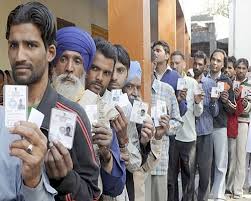Over the years, lure of the ‘abroad’ option, poor education and drugs have found a firm grip on the state’s disorientated youth. AAP is using these issues to emerge as a third option
Punjab is a unique state in its own way and has its own set of problems. And these problems were never part of the poll manifestos of the traditional parties till the last election.
Usually seen as politically inactive even during the elections, people of Punjab have given a tough lesson to the leaders contesting the Lok Sabha elections this time around.
Drugs, which have been part of the state’s history, is one such raging poll issue which is not just being discussed openly but leaders are being asked about the possible solutions for the same. The biggest failure of the state – where 70 percent of youth are addicted to drugs – has been in checking the rampant drug menace, which increases during election hours.
Allegations of Akali and Congress leaders’ link with drug mafia are very common here. But this time people have shown anger and questioned the candidates instead. In various constituencies, candidates of Akali Dal-BJP and the Congress have faced questions about what measures they will take to end the problem that threatens the youth.
Lapping up the drug issue, the Aam Aadmi Party (AAP) candidates have been vocal against it in their poll rallies. Some of them have based their election campaign on drugs by organizing street plays.
While the recent media reports suggest that leaders of Akali Dal, BJP and Congress all have a hand in the drug racket, AAP is seen as the clean party.
The problem of the youth
Lure of foreign lands, poor education and drugs have their firm grip on the state’s disorientated youth. Part of the blame is also on the state’s failure in generating employment. Privatisation of higher education has resulted in mushrooming of colleges making it easier for students to gain degrees. Sadly, employment generation has not kept pace. The number of jobless has only increased over the years, the opposition alleged. Still, there has been no mention of this in the power circles.
Prof Santokh Singh, a political analyst based in Ludhiana (Punjab Agricultural University) says social issues have played an important role in these elections, perhaps for the first time in the history of Punjab politics: “Parties have been doing mud-slinging in every election. They are trained in fooling people. But this time people forced parties to talk about issue of drugs and unemployment, which never took centre stage.”
Singh says that though Manpreet Badal, who had formed People’s Party of Punjab during assembly elections in 2012, had raised several such issues, it failed to grab people’s attention and was seen as anti-poor instead. But Arvind Kejriwal-led AAP not just brought back the issues of corruption, drugs and poor quality-high cost-higher education back in the limelight but has also been successful in grabbing people’s attention. He points out at the list of its candidates with clean image as one of the reasons. “They came up with a team of good candidates including doctors, teachers, lawyers and artists and have been able to get people’s support.”
Another major issue that has created ripples in the political circle is that of cancer problem in Malwa region. The absence of affordable healthcare in Punjab forces dozens of cancer patients to travel neighboring state of Rajasthan. During 2012 assembly polls, the Akali Dal had promised to build three cancer hospitals in the state, but the only step in that direction has been the laying of a foundation stone near Chandigarh.
Experts believe unfulfilled promises by the state government have resulted in resentment among the voters against the state government.
“There has been no Modi wave in Punjab. Akalis tried to create it but flopped. And Congress has faced the problem of infighting. All this created space for AAP, which they used effectively,” says Singh. He adds, “The poor class, youth and the working class are all backing the party [AAP]. I won’t be surprised if they manage to get seats in majority here.”
The constituencies where they are expected to perform well include Patiala, Sangrur and Faridkot. And on other three seats there is a close contest between them and Congress.
The state, known for two-corner fights between Akali Dal-BJP and Congress, had scripted history when Akali Dal won a consecutive term in the assembly elections in 2012 – the first by any party. But the post-2012 period has not been easy for the Badals. The anti-incumbency factor against the SAD-BJP government is high; and Congress is facing the same threat at the centre. It would therefore not be surprising if the relatively new party creates a magic and win seats in majority. But AAP certainly will have to take these issues to a logical end to remain in the fight for the long run. The state is set to vote on April 30 in the seventh phase of the Lok Sabha elections.

